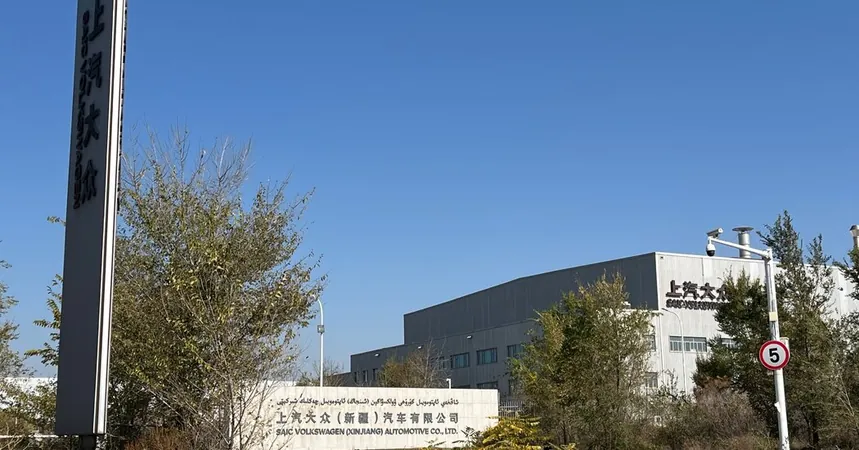
Volkswagen Shuts Down Operations in Xinjiang Amid Human Rights Concerns and Economic Shifts
2024-11-28
Author: Ting
Volkswagen's Decision to Divest
In a significant move, Volkswagen announced on Wednesday its decision to divest from its operations in Xinjiang, a region in northwestern China that has gained notoriety due to allegations of human rights abuses against predominantly Muslim ethnic groups, particularly the Uyghurs. This marks the end of an over a decade-long presence in an area that has become increasingly fraught with controversy.
Background on Volkswagen's Operations in Xinjiang
Volkswagen owned a joint venture assembly plant in Urumqi, the capital of Xinjiang, as well as two test tracks, which made it the most visible multinational company in the region. This visibility attracted mounting criticism from human rights advocates and scrutiny from international governments, leading to restrictions on imports from Xinjiang particularly by the United States and several European nations. Evidence of forced labor in the region has fueled these restrictions, making it a politically charged issue for global corporations.
Chinese Government Pressure
While VW maintained its operations in Xinjiang, the Chinese government pressured foreign businesses to remain in the region despite the escalating concerns. For example, the Ministry of Commerce recently launched an investigation into the corporation PVH, parent company to Calvin Klein and Tommy Hilfiger, for 'discriminatory measures' against Xinjiang-produced goods.
Market Shifts and Plant Closure
Volkswagen's Urumqi plant has not produced vehicles since 2019, primarily due to the rapidly shifting market favoring electric vehicles (EVs) instead of gasoline-powered cars—a product the plant was designed to manufacture. With half of the vehicles sold in China now being battery-electric or plug-in hybrids, Volkswagen finds itself with considerable excess production capacity. Additionally, competition from local Chinese manufacturers, particularly BYD, has further pressured Volkswagen’s sales strategies.
Human Rights Concerns and Labor Issues
The Urumqi operation, which once relied on employing many Uyghurs, has been under a cloud of political tension. It is estimated that since 2014, China has detained over a million Uyghurs and other minorities in internment camps under the guise of combating extremism, leading to widespread condemnation from human rights organizations. Reports of forced labor and the government’s coercive policies have led to significant ethical concerns for companies operating in the region.
Volkswagen's Response to Criticism
Critics have asserted that Volkswagen did not adequately safeguard the anonymity of workers in its attempts to align with international labor standards, which only intensified scrutiny of its practices. Volkswagen, however, has denied any involvement in forced labor related to its projects in Xinjiang.
Strategic Shift Towards Electric Vehicles
With the decline in gasoline vehicle sales and a pivot towards electric vehicles, the company has strategically planned to close factories globally, including those in Germany, cementing its transition toward sustainable automotive solutions. Volkswagen has committed to collaborating with its state-owned joint venture partner, SAIC Motor, to introduce at least eight new electric models by 2030.
Conclusion and Future Outlook
Thus, as Volkswagen takes steps to exit Xinjiang and redefine its operational strategy, it simultaneously faces the dilemma of balancing economic opportunity against ethical commitments in its business practices. The company has reaffirmed its dedication to its broader partnerships in China, but its departure from Xinjiang highlights the complicated dynamics between business interests, human rights concerns, and market evolution in one of the world’s largest automotive markets.
As the situation unfolds, observers are keen to see how Volkswagen and other multinational corporations navigate the complexities of operating in regions where human rights practices come under scrutiny, and how this shifting landscape will redefine the global automotive industry in the years to come.



 Brasil (PT)
Brasil (PT)
 Canada (EN)
Canada (EN)
 Chile (ES)
Chile (ES)
 España (ES)
España (ES)
 France (FR)
France (FR)
 Hong Kong (EN)
Hong Kong (EN)
 Italia (IT)
Italia (IT)
 日本 (JA)
日本 (JA)
 Magyarország (HU)
Magyarország (HU)
 Norge (NO)
Norge (NO)
 Polska (PL)
Polska (PL)
 Schweiz (DE)
Schweiz (DE)
 Singapore (EN)
Singapore (EN)
 Sverige (SV)
Sverige (SV)
 Suomi (FI)
Suomi (FI)
 Türkiye (TR)
Türkiye (TR)